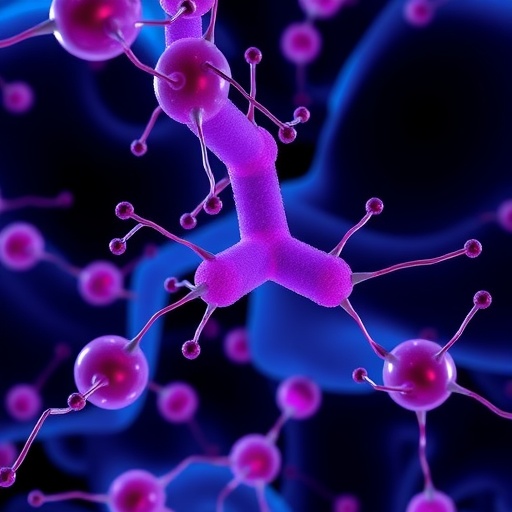In an outstanding breakthrough in breast cancer research, scientists have unveiled a new framework that intertwines macro-level clinical data with micro-level genomic insights. This innovative approach, termed a macro–micro–macro radiogenomic framework, has paved the way for identifying novel biomarkers essential for modulating immune responses within tumor microenvironments. Central to this study is the discovery of FIBCD1, a biomarker with promising potential for enhancing immunotherapeutic strategies in breast cancer treatment.
Breast cancer remains one of the most prevalent cancers worldwide, contributing significantly to mortality rates among women. The complexity of breast cancer, characterized by its diverse molecular subtypes and varying responses to treatments, necessitates multifaceted approaches to improve patient outcomes. The research team led by Hong et al. has pursued a comprehensive strategy that integrates radiogenomics, an interdisciplinary field combining radiology with genomic data, enabling advanced insights into tumor biology.
The macro–micro–macro framework employed in this research is groundbreaking. It begins with macro-level data, which encompasses clinical outcomes, imaging results, and treatment responses. This level is critical for understanding how systemic factors influence cancer progression. Subsequently, the framework delves into micro-level analysis, examining cellular and molecular interactions within tumor tissues. By bridging these two levels of analysis, researchers can establish connections between observable clinical phenomena and underlying biological mechanisms.
FIBCD1, identified in this study as a key immune-modulating biomarker, plays a crucial role in the immune landscape of breast cancer. This protein is involved in the recognition and uptake of glycosylated ligands, thereby participating in regulating immune responses. The effects of FIBCD1 extend beyond classical immune modulation, impacting tumor-associated macrophages and influencing their behavior within the tumor microenvironment.
Understanding the implications of this discovery requires an appreciation of the immune system’s role in cancer. The tumor microenvironment, infiltrated with various immune cells, plays a significant role in cancer development and progression. Typically, certain immune cells, such as T cells and natural killer (NK) cells, function to eliminate cancer cells. However, cancer cells often develop strategies to evade these immune responses, leading to treatment resistance and disease progression.
Research has highlighted the crucial role of the immunometabolic state of tumor-infiltrating immune cells in determining their functionality. In this context, FIBCD1’s involvement offers novel therapeutic avenues. By modulating its expression or function, it may be possible to enhance anti-tumor immunity or reprogram immune cells to respond more effectively to cancer therapies.
The methodology employed in this study illustrates a significant advancement in integrative biological approaches. The combination of imaging data with genomic profiling offers unprecedented opportunities for discovering biomarkers that correlate with patient responses to therapy. By leveraging advanced imaging modalities and high-throughput sequencing technologies, researchers can unearth correlations between tumor characteristics and patient outcomes.
This study also emphasizes the importance of personalized medicine in breast cancer treatment. Understanding how individual tumors interact with the immune system can facilitate the development of tailored therapies that target specific vulnerabilities within a patient’s tumor microenvironment. The insights gained from the macro–micro–macro framework are not limited to FIBCD1 but potentially encompass a wider array of biomarkers that could revolutionize treatment protocols.
Furthermore, with the rapid advancements in artificial intelligence and machine learning, the analytical capabilities of such integrative frameworks are set to expand even further. Algorithms can help identify patterns within complex datasets, enabling more nuanced interpretations of how distinct phenotypes might respond to specific interventions. The synergy between computational analysis and biological research promises to unveil new paradigms in cancer therapy.
The implications of FIBCD1’s role extend beyond breast cancer. The principles established in this research can inform studies in other cancer types, where immune modulation is pivotal to treatment efficacy. As researchers continue to explore the nuances of cancer immunology, biomarker discovery will remain a cornerstone of developing innovative therapeutic strategies.
In conclusion, this research by Hong et al. marks a significant step forward in understanding the interplay between tumor biology and the immune system in breast cancer. The identification of FIBCD1 as a key player highlights the potential for new therapeutic strategies that harness immune modulation. As the scientific community endeavors to unravel the complexities of cancer treatment, integrating various scientific disciplines will be essential. The macro–micro–macro radiogenomic framework exemplifies how collaborative approaches can yield transformative insights, paving the way for advancements in personalized medicine and improved patient outcomes.
The future of breast cancer research and treatment is promising, as the discovery of FIBCD1 opens new avenues for exploration. As more studies build on this foundation, the goal of improving survival rates and quality of life for breast cancer patients becomes increasingly attainable. Continued research and collaboration across fields will be vital in transforming these innovative ideas into clinical practice, ultimately benefiting patients globally.
This pivotal milestone not only enhances our understanding of breast cancer but acts as a beacon of hope for researchers and clinicians dedicated to eradicating this formidable disease.
Subject of Research: Breast cancer, immune modulation, biomarkers
Article Title: A macro–micro–macro radiogenomic framework identifies FIBCD1 as a key immune-modulating biomarker in breast cancer.
Article References: Hong, M., Chen, X., Huang, X. et al. A macro–micro–macro radiogenomic framework identifies FIBCD1 as a key immune-modulating biomarker in breast cancer. J Transl Med 23, 1350 (2025). https://doi.org/10.1186/s12967-025-07389-z
Image Credits: AI Generated
DOI: https://doi.org/10.1186/s12967-025-07389-z
Keywords: Breast cancer, FIBCD1, immune modulation, radiogenomics, biomarkers, personalized medicine.
Tags: advanced insights into tumor biologybreast cancer immunology researchFIBCD1 biomarker in breast cancerimmunotherapeutic strategies for breast cancerintegrating clinical data and genomicsinterdisciplinary approaches to cancer researchmacro-micro-macro radiogenomic frameworkmolecular subtypes of breast cancernovel biomarkers for immune modulationpatient outcomes in breast cancerradiogenomics in cancer treatmenttumor microenvironment in breast cancer





